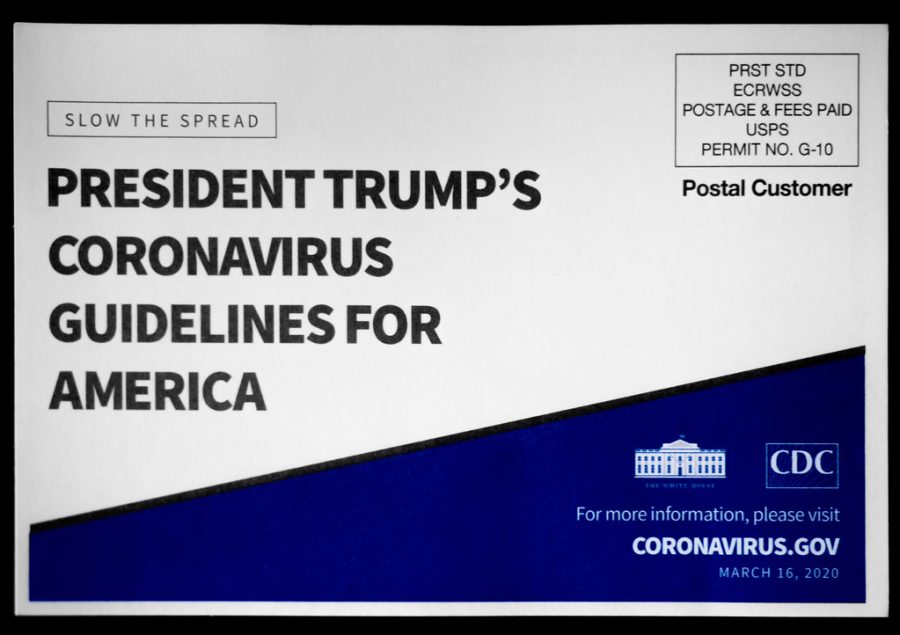Time of panic requires clarity of news
Thomas Cizauskas via Creative Commons
A nationwide coronavirus mailing in late March was criticized in part for displaying the president’s name more prominently than social distancing guidelines, printed on the back of the postcard.
Things change. Life happens. Not everything goes according to plan. Originally, my next piece in The Guilfordian would have been an op-ed about the bell that rings every hour and can be heard all across campus. I would have thrown in an Anita Ward joke and claimed that members of the Guilford community are constantly tracking time, but none of us actually have it.
Instead, with the college closed for the rest of the semester, we are quarantined in our homes knowing time is the one thing we will definitely have during this pandemic.
Some of us can afford to lose track of time, not know what day of the week it is, or stay up as late as possible. At any moment, especially this one, what we cannot afford is to lose the distinction between what are facts and what is fiction.
In a truly unprecedented time of panic and uncertainty, we must hear and know the truth. This is a time to depend on reliable journalists.
The total number of coronavirus cases has surpassed 4 million worldwide. Over 700 of them are in Guilford County. In New York, Time magazine has reported that more deaths have been caused by COVID-19 in the city than from the terrorist attacks on September 11, 2001. These statistics are troubling and shocking, to say the least.
It is understandable to want to avert your eyes and tune out bad news. However disheartening it may be, it is vital that we have access to fact-based news when we can view it, to understand the severity of this disease.
To cover the virus itself only scratches the surface of how much the world has changed. Will I receive a stimulus check? Will sports be played again this year with or without fans, or at all? Is this ever going to end and return to normalcy? It is difficult to say what life will look like one month from now.
I can assure you, the predictions for April that I made back in early March turned out to be wildly inaccurate. During Guilford’s spring break, I said to myself that I did not want spring break to end and I did not want to go back to school. But the rise of a global pandemic that would shut down the campus and halt normal life was not something I imagined or wished for at all.
In times when there is a lot that we do not know, it is important to return to the things that we do know. We are sure that personal hygiene, such as hand-washing, kills bacteria. We are sure that social distancing greatly reduces the risk of catching infections. We are (pretty) sure that Carole Baskin killed her husband. As “Vanderpump Rules” star Stassi Schroeder put it in a March 24 tweet, “We’re all in agreement that we need to stay inside, wash hands, and that Carole killed her husband, right?”
The root of all fear is uncertainty, and staying informed is what helps us stay calm. A better world is a more transparent one. CNN journalist Chris Cuomo, who was diagnosed with COVID-19 in late March, has continued to provide updates on his health on CNN and share his experience living with the virus. I appreciate his account, as a more human perspective can help people understand more about the virus. I also appreciate his strength and willingness to go on TV, despite being ill and self-quarantined. There are times where I am perfectly healthy and I still don’t feel like going to class.
When the facts are in such high demand, who better to turn to than news reporters? Well, medical professionals, but other than that, who else? The role of health experts is to treat people, but in cases like this, not all are able to relay their knowledge to the public. Even those who are capable may not share information in a way that the general public may understand. This is why journalism matters, from the local paper in your hometown to the news program nationally televised during prime time. People always want to know what is happening, especially in a crisis, and journalists make a career out of meeting this need.
Those who spread misinformation are the antagonists in this pandemic. President Trump even touted the drug, hydroxychloroquine, which is actually believed to be more fatal than beneficial to COVID-19 patients. The antagonists are not the journalists who report information. After all, they are just the messengers.











